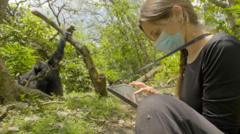Nestled in the lush greenery of southwest Virginia, Dr. Ryan Huish's family property hosts an array of medicinal herbs that exemplify the region's rich forestry. Leading a student group through his 60-acre land near Duffield, Dr. Huish illustrates the value of local edible plants such as ramps, trout lilies, and even spicy Appalachian wasabi. These plants form a core part of Appalachian tradition, historically used for consumption, medicinal purposes, and economic support.
Despite their cultural significance, the market for forest botanicals has faced challenges, including low prices and overharvesting due to a lack of regulation. "The trade of forest botanicals has been ongoing for 300 years in the Appalachian Mountains," explains Katie Commender from the Appalachian Harvest Herb Hub. She highlights the growing concern that traditional knowledge is not being effectively passed on to younger generations.
The initiative is part of the broader "50 States, 50 Fixes" project, aimed at uncovering local solutions to environmental issues, showcasing how communities are working to restore and sustain traditions while creating a profitable herbal economy for the future.





















